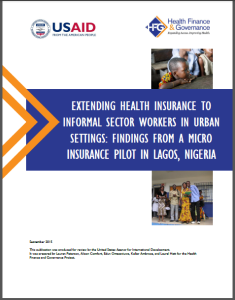Extending Health Insurance to Informal Sector Workers in Urban Settings: Findings from a Micro Insurance Pilot in Lagos, Nigeria
Categories: Health Insurance (CBHI, SHI), Maternal, Neonatal and Child Health (MNCH), Publications
Resource Type: Report
Authors: Lauren Peterson, Alison Comfort, Edun Omasanjuwa, Kelley Ambrose, and Laurel Hatt
Published: September 2015
As a growing number of low- and middle-income countries commit to achieving universal health coverage (UHC), micro health insurance provides a potential model to finance health services for informal sector workers in the absence of a comprehensive government insurance program targeting that group. Micro health insurance, broadly defined, is health insurance specifically priced and designed to meet the needs of low-income populations. This often means charging lower premiums, offering limited benefit packages, and utilizing alternative distribution channels.
This evaluation was designed to assess the potential of a micro health insurance partnership in Nigeria to improve informal sector workers’ access to health services, particularly maternal, newborn, and child health (MNCH) care. The Lagos-based “Pro-Poor Private Health Insurance” (PPPHI) partnership brought together a private insurer and a microfinance bank (MFB) to offer insurance to microfinance loan recipients.
The partners hoped to leverage the infrastructure of the MFB and the MFB loan officers’ relationships with clients to deliver the product. A willingness-to-pay study and other market research were conducted to design a benefit package that would offer value to these clients; this research indicated that clients were most interested in purchasing coverage for maternity and outpatient care. The product was priced at a level clients could afford and did not require additional subsidies, thereby promoting the sustainability of the scheme. Given fluctuations in clients’ income, the MFB agreed to pay premiums to the insurer upfront, while clients could repay the MFB in interest-free installments as they repaid their loans. To improve access to priority MNCH services, there were no waiting periods for eligibility for maternity care. Clients gained access to the provider network of a private insurer that served formal sector workers.
Download




